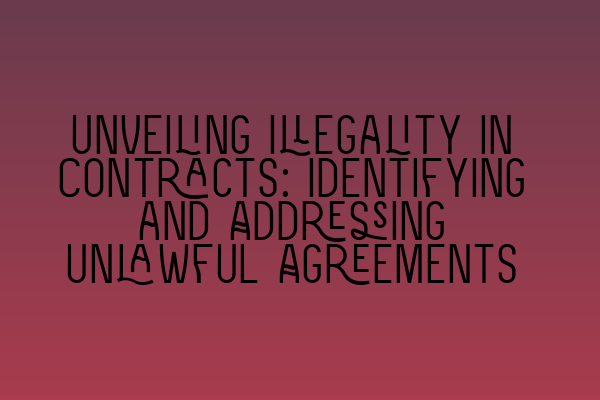Unveiling Illegality in Contracts: Identifying and Addressing Unlawful Agreements
A contract is the cornerstone of any legal agreement, providing a framework for parties to determine their respective rights and obligations. However, not all contracts are created equal, and sometimes parties unknowingly enter into agreements that are illegal or contrary to public policy. Unlawful contracts can have serious repercussions, including unenforceability, financial penalties, and reputational damage.
In this article, we will explore the concept of illegality in contracts, its various forms, and the steps that solicitors and individuals can take to identify and address unlawful agreements.
Understanding Illegality in Contracts
Illegality refers to the state of being contrary to law or illegal. In the context of contracts, illegality can arise from a variety of factors, including:
- Statutory prohibition: Certain activities or agreements are explicitly prohibited by law. For example, contracts relating to illegal substances or activities, such as drug trafficking or money laundering, are considered illegal and unenforceable.
- Public policy considerations: Contracts that are contrary to public policy or morality may be deemed illegal. These can include agreements that promote fraud, corruption, or harm to the public interest.
- Restraint of trade: Contracts that unreasonably restrict a person’s freedom to carry out their trade or profession may be considered void and unenforceable. This often applies to non-competition clauses or agreements that excessively limit an individual’s future employment opportunities.
Identifying Unlawful Agreements
Recognizing the presence of illegality in contracts requires a careful examination of the terms and nature of the agreement. Here are some key indicators that may suggest an unlawful agreement:
- Contradiction with statutory provisions: If the contract’s subject matter or purpose is expressly prohibited by law, it is likely to be illegal. Solicitors must be knowledgeable about relevant legislation and regulations to identify such conflicts.
- Public policy concerns: Contracts that undermine public policy or morality should raise red flags. This can include agreements that facilitate criminal activity or harm the environment or public health.
- Excessive restraint: Contracts that unreasonably restrict a party’s freedom may be rendered unenforceable. Solicitors should pay attention to clauses that limit competition or unduly restrict a party’s ability to pursue their trade or profession.
- Unconscionability: If a contract is fundamentally unfair or oppressive to one party, it may be deemed illegal. This often occurs in cases of unequal bargaining power or exploitation.
Addressing Unlawful Agreements
When it comes to dealing with unlawful contracts, solicitors play a crucial role in advising clients and taking appropriate action. Here are some steps that solicitors can take to address unlawful agreements:
- Evaluation: Solicitors should thoroughly examine the contract in question and assess its legality. This includes analyzing relevant legislation, case law, and public policy considerations to determine the potential risks and consequences.
- Advice: Based on their evaluation, solicitors should provide clear and comprehensive advice to their clients regarding the illegality of the agreement. This includes highlighting the potential consequences and exploring alternative legal options, if available.
- Termination: If a contract is found to be illegal, solicitors can assist their clients in terminating the agreement. This may involve notifying the other party, seeking court intervention, or negotiating an amicable resolution.
- Remedies: Depending on the circumstances, solicitors may help clients pursue legal remedies, such as restitution or damages, to mitigate the losses arising from the unlawful agreement.
- Preventive measures: Solicitors can also play a preventive role by advising clients on how to structure contracts to avoid illegality and ensure compliance with relevant laws and regulations.
Conclusion
Identifying and addressing illegality in contracts is essential for maintaining the integrity of legal agreements and protecting the interests of parties involved. As solicitors, it is our duty to guide clients through the complexities of contract law, ensuring they are aware of the potential risks and consequences associated with unlawful agreements. By staying informed, providing sound advice, and taking appropriate action, solicitors can navigate the intricate landscape of contract law and uphold the principles of justice and legality.
For more information on legal challenges and pitfalls, we recommend reading our article on Navigating Legal Challenges and Pitfalls in Your Practice. If you are interested in exploring different specializations within the legal profession, check out our guide on Exploring Different Solicitor Specializations: Finding Your Niche. And if you are considering a career in law, be sure to read our article on the Top Recommendations for Law Schools in the UK.
